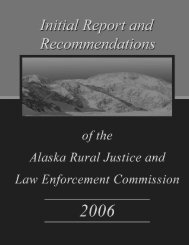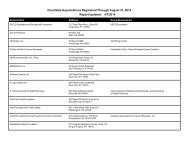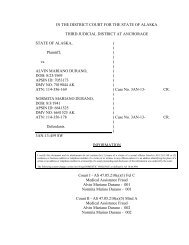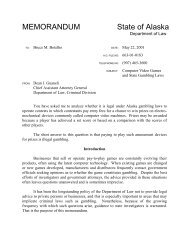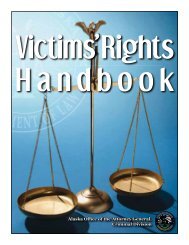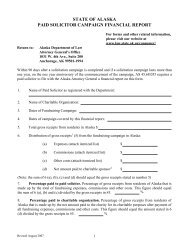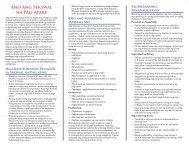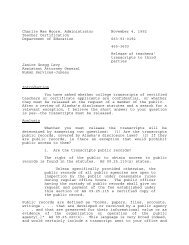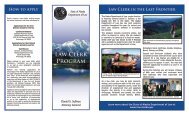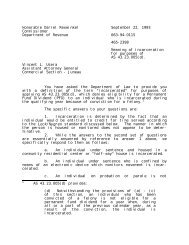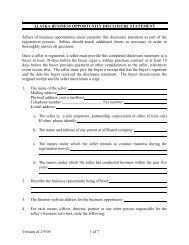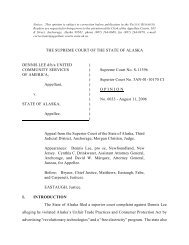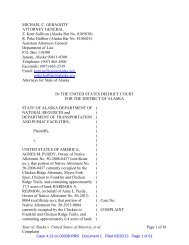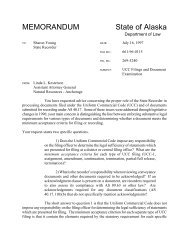Applicability of AS 23.05.140(b) to Court System Employees - Alaska ...
Applicability of AS 23.05.140(b) to Court System Employees - Alaska ...
Applicability of AS 23.05.140(b) to Court System Employees - Alaska ...
You also want an ePaper? Increase the reach of your titles
YUMPU automatically turns print PDFs into web optimized ePapers that Google loves.
March 14, 1996<br />
Arthur H. Snowden II<br />
Administrative Direc<strong>to</strong>r<br />
<strong>Alaska</strong> <strong>Court</strong> <strong>System</strong><br />
303 K Street<br />
Anchorage, <strong>Alaska</strong> 99501<br />
Re:<br />
<strong>Applicability</strong> <strong>of</strong> <strong>AS</strong> <strong>23.05.140</strong>(b) <strong>to</strong> <strong>Court</strong><br />
<strong>System</strong> <strong>Employees</strong><br />
A.G. file no: 663-96-0174<br />
Dear Mr. Snowden:<br />
You have asked for our opinion as <strong>to</strong> whether <strong>AS</strong> <strong>23.05.140</strong>(b) applies <strong>to</strong> court<br />
system employees. That statute provides:<br />
(b) If the employment is terminated, regardless <strong>of</strong> the cause <strong>of</strong> termination,<br />
all wages, salaries, or other compensation for labor or services become due<br />
immediately and shall be paid within three working days after the<br />
termination at the place where the employee is usually paid or at a location<br />
agreed upon by the employer and employee.<br />
As you note in your letter, the statute on its face appears <strong>to</strong> apply <strong>to</strong> state<br />
employees (including court system employees), because the state obviously employs people, and<br />
there is no definition <strong>of</strong> “employer” in or applicable <strong>to</strong> <strong>AS</strong> 23.05 that excludes the state. It is<br />
nevertheless our opinion that <strong>AS</strong> <strong>23.05.140</strong>(b) is not applicable <strong>to</strong> court system or other state<br />
employees.<br />
We reach this conclusion by following the rule <strong>of</strong> law that a statute creating a duty<br />
does not apply <strong>to</strong> the state unless the statute explicitly provides that it so applies. We have relied<br />
upon this rule in two previous opinions: 1974 Inf. Op. Att’y Gen. (Feb. 22; Douglas) (stateowned<br />
nursing homes and hospitals are exempt from pharmacy licensing requirements); 1981 Inf.<br />
Op. Att’y Gen. (Sept. 15; J-66-190-81) (statute in <strong>AS</strong> 23 requiring that employer pay return<br />
transportation out <strong>of</strong> <strong>Alaska</strong> for certain employees furnished transportation <strong>to</strong> <strong>Alaska</strong>). In our<br />
1981 opinion we cited several cases from other jurisdictions in support <strong>of</strong> this rule. More recent<br />
authority following the rule includes State ex rel. Dep’t <strong>of</strong> Health Serv. v. Cochise Co., 800 P.2d
Arthur Snowden, Administrative Direc<strong>to</strong>r March 14, 1996<br />
<strong>Alaska</strong> <strong>Court</strong> <strong>System</strong> Page 2<br />
A.G. file no: 663-96-0174<br />
578 (Ariz. 1990), and Krasney v. Cura<strong>to</strong>rs <strong>of</strong> University <strong>of</strong> Missouri, 765 S.W.2d 646 (Mo.<br />
App. 1989) (construing a statute that, like <strong>AS</strong> <strong>23.05.140</strong>(b), used the term “employer”).<br />
Although there is no reported <strong>Alaska</strong> case addressing the applicability <strong>of</strong> this rule in the state, we<br />
see no reason now, as we saw none then, <strong>to</strong> believe that the <strong>Alaska</strong> courts would choose not <strong>to</strong><br />
follow it here. 1 Especially significant, in our opinion, is the fact that <strong>AS</strong> <strong>23.05.140</strong>(b) was enacted<br />
in 1945 and has not been amended in any substantial manner since then. A statute should <strong>of</strong><br />
course be interpreted consistently with the intent <strong>of</strong> the legislature that enacted it. Because the<br />
doctrine <strong>of</strong> sovereign immunity was virtually unquestioned in 1945, we think it is almost certain<br />
that the 1945 legislature would have intended that the rule <strong>of</strong> law discussed above be followed<br />
and that <strong>AS</strong> <strong>23.05.140</strong>(b) not be applied <strong>to</strong> the state as an employer.<br />
JBG:jn<br />
Please feel free <strong>to</strong> contact us if you have any questions about this letter.<br />
Sincerely,<br />
BRUCE M. BOTELHO<br />
ATTORNEY GENERAL<br />
By:<br />
John B. Gaguine<br />
Assistant At<strong>to</strong>rney General<br />
1<br />
In our 1974 opinion we cited a pre-statehood federal case in <strong>Alaska</strong> which followed the rule. <strong>Alaska</strong><br />
Rural Rehabilitation Corp. v. Ubert, 10 <strong>Alaska</strong> Reports 508, 517 (D. <strong>Alaska</strong> 1945). Such cases, however, are<br />
not binding precedent for the state courts.



